Leadership and Management for Service Industries-Report
VerifiedAdded on 2023/01/19
|20
|6052
|67
Report
AI Summary
This report reviews classical management theories and leadership styles, applying them to the service industry context, particularly within organizations like Hilton Hotel. It explores internal and external factors influencing management styles and structures, assesses current and future management and leadership skills, differentiating between ‘hard’ and ‘soft’ skills. The report also demonstrates management and leadership skills in a service industry context by comparing and contrasting different service industry organizations’ change management systems and leadership in implementing change. The analysis covers autocratic, democratic, and transformational leadership styles, evaluating their effectiveness in enhancing company growth and employee motivation. The report concludes by emphasizing the importance of adapting management and leadership approaches to meet the evolving needs of the service sector, with a focus on employee engagement and organizational performance. Desklib provides access to this and other solved assignments for students.
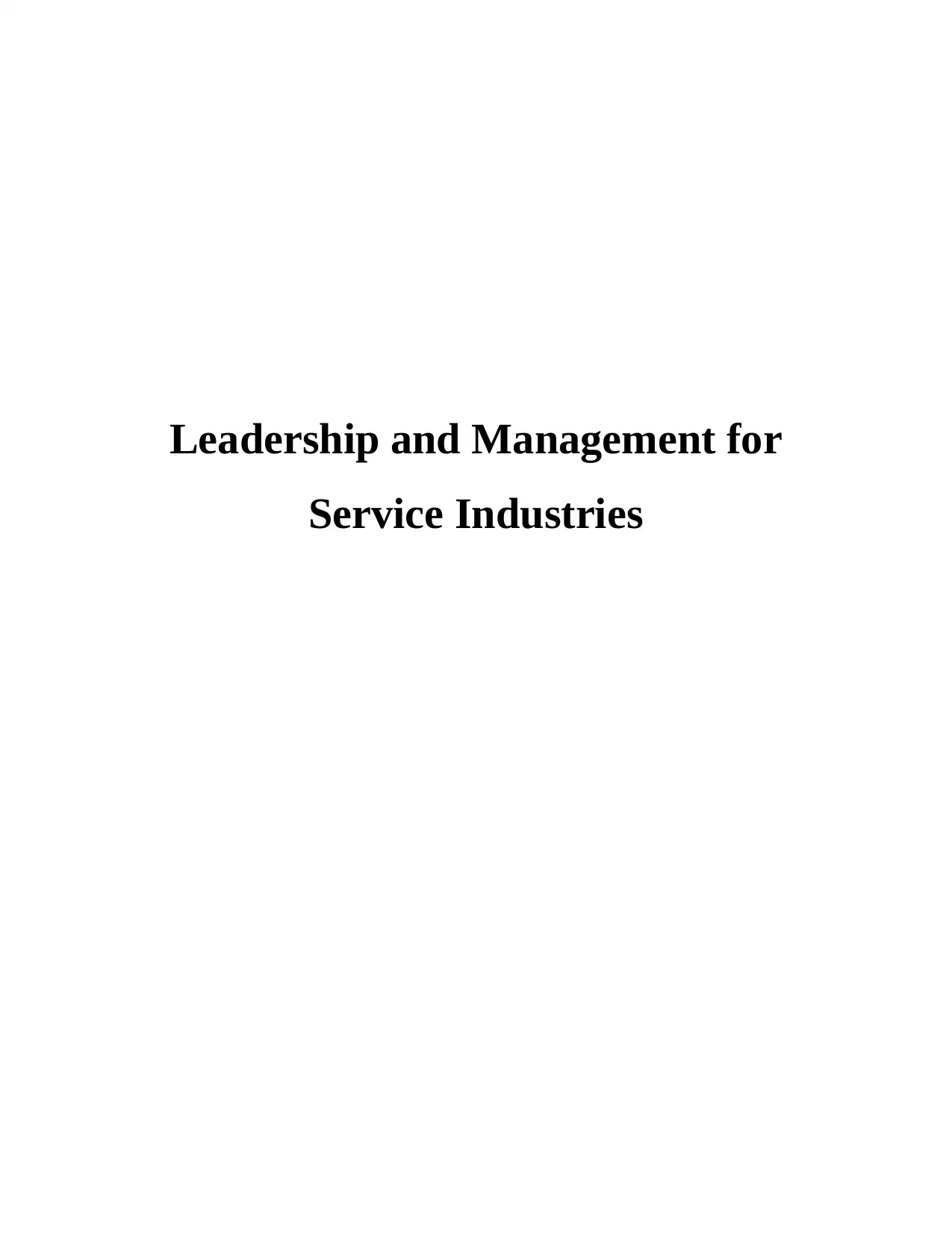
Leadership and Management for
Service Industries
Service Industries
Paraphrase This Document
Need a fresh take? Get an instant paraphrase of this document with our AI Paraphraser
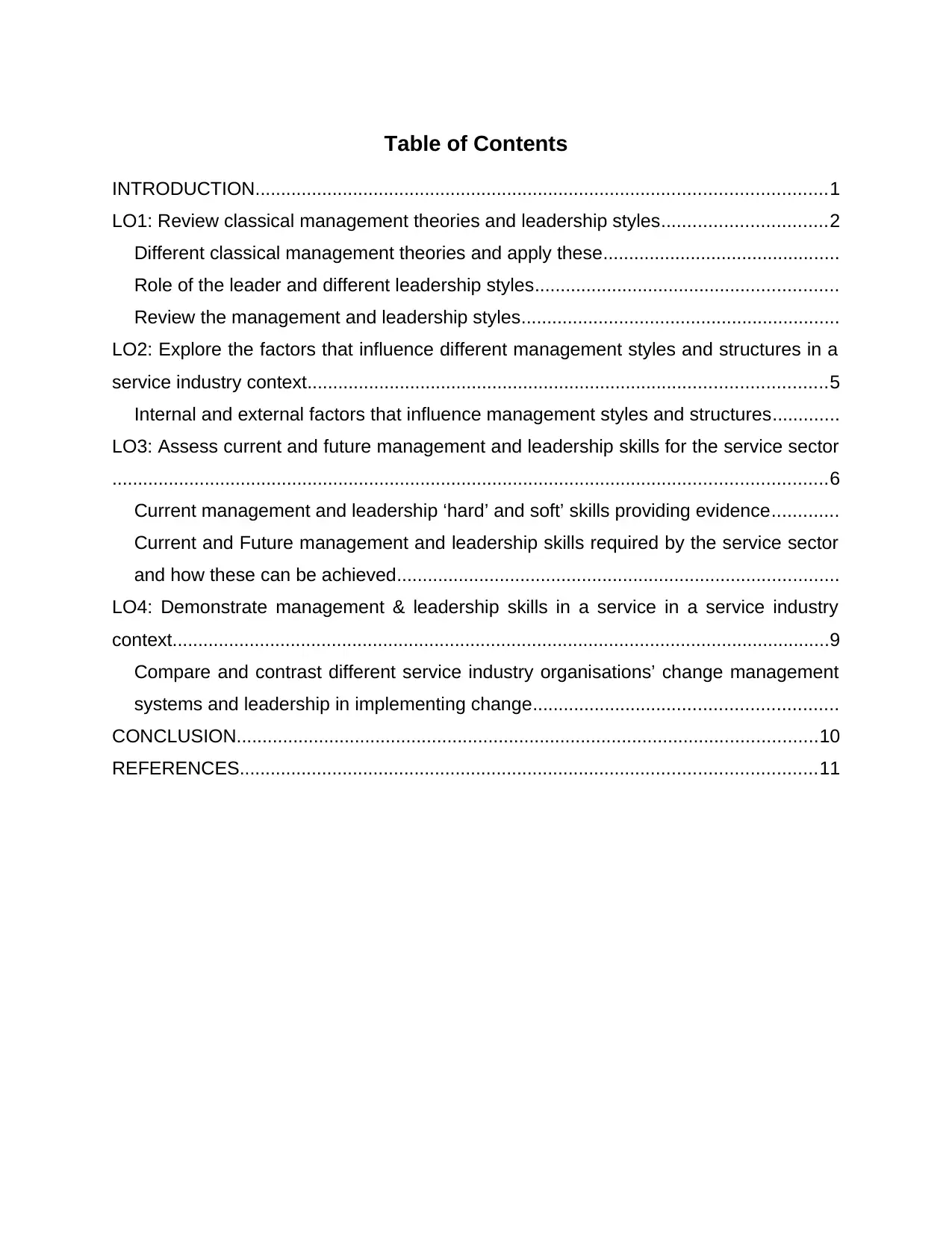
Table of Contents
INTRODUCTION...............................................................................................................1
LO1: Review classical management theories and leadership styles................................2
Different classical management theories and apply these..............................................
Role of the leader and different leadership styles...........................................................
Review the management and leadership styles..............................................................
LO2: Explore the factors that influence different management styles and structures in a
service industry context.....................................................................................................5
Internal and external factors that influence management styles and structures.............
LO3: Assess current and future management and leadership skills for the service sector
...........................................................................................................................................6
Current management and leadership ‘hard’ and soft’ skills providing evidence.............
Current and Future management and leadership skills required by the service sector
and how these can be achieved......................................................................................
LO4: Demonstrate management & leadership skills in a service in a service industry
context................................................................................................................................9
Compare and contrast different service industry organisations’ change management
systems and leadership in implementing change...........................................................
CONCLUSION.................................................................................................................10
REFERENCES................................................................................................................11
INTRODUCTION...............................................................................................................1
LO1: Review classical management theories and leadership styles................................2
Different classical management theories and apply these..............................................
Role of the leader and different leadership styles...........................................................
Review the management and leadership styles..............................................................
LO2: Explore the factors that influence different management styles and structures in a
service industry context.....................................................................................................5
Internal and external factors that influence management styles and structures.............
LO3: Assess current and future management and leadership skills for the service sector
...........................................................................................................................................6
Current management and leadership ‘hard’ and soft’ skills providing evidence.............
Current and Future management and leadership skills required by the service sector
and how these can be achieved......................................................................................
LO4: Demonstrate management & leadership skills in a service in a service industry
context................................................................................................................................9
Compare and contrast different service industry organisations’ change management
systems and leadership in implementing change...........................................................
CONCLUSION.................................................................................................................10
REFERENCES................................................................................................................11
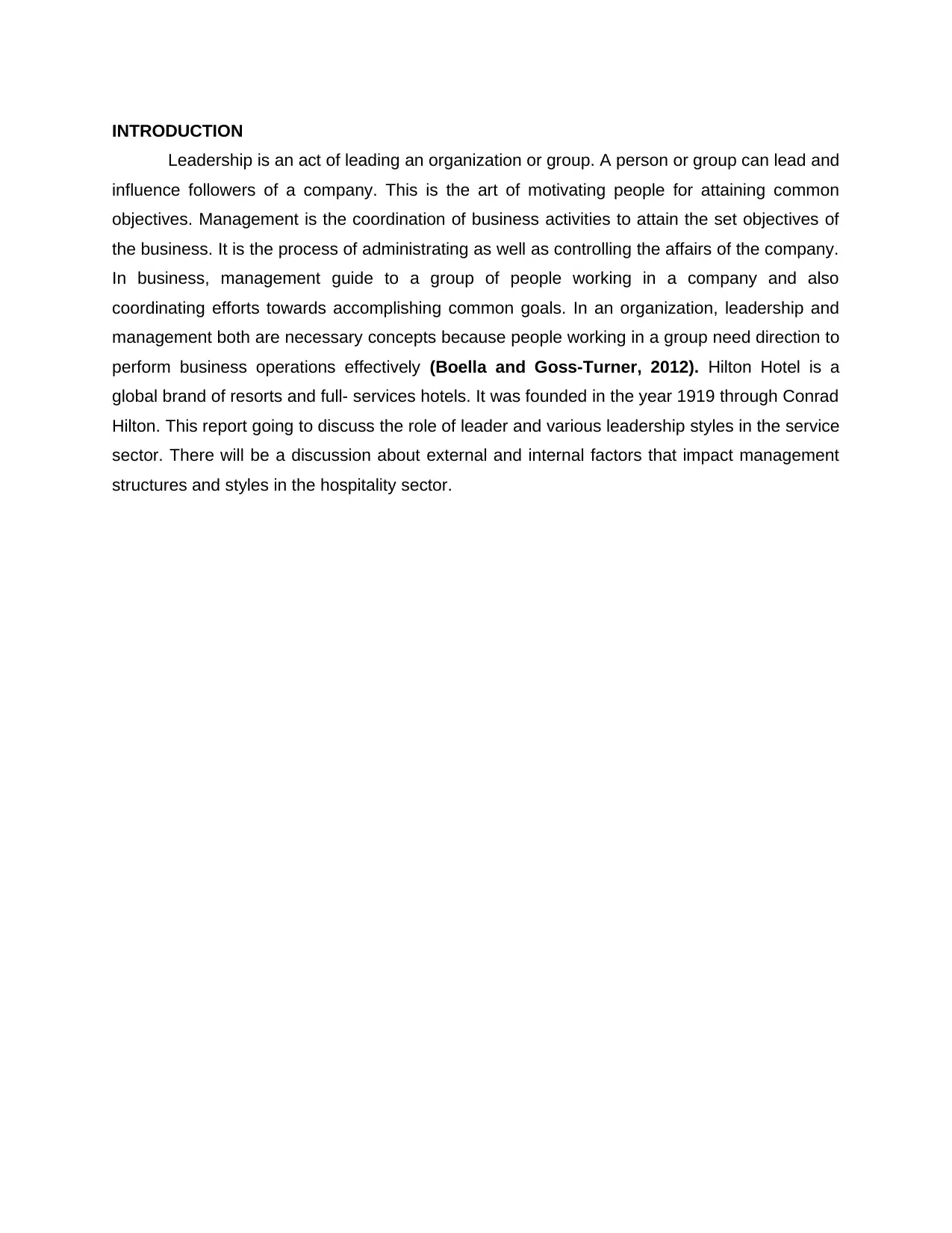
INTRODUCTION
Leadership is an act of leading an organization or group. A person or group can lead and
influence followers of a company. This is the art of motivating people for attaining common
objectives. Management is the coordination of business activities to attain the set objectives of
the business. It is the process of administrating as well as controlling the affairs of the company.
In business, management guide to a group of people working in a company and also
coordinating efforts towards accomplishing common goals. In an organization, leadership and
management both are necessary concepts because people working in a group need direction to
perform business operations effectively (Boella and Goss-Turner, 2012). Hilton Hotel is a
global brand of resorts and full- services hotels. It was founded in the year 1919 through Conrad
Hilton. This report going to discuss the role of leader and various leadership styles in the service
sector. There will be a discussion about external and internal factors that impact management
structures and styles in the hospitality sector.
Leadership is an act of leading an organization or group. A person or group can lead and
influence followers of a company. This is the art of motivating people for attaining common
objectives. Management is the coordination of business activities to attain the set objectives of
the business. It is the process of administrating as well as controlling the affairs of the company.
In business, management guide to a group of people working in a company and also
coordinating efforts towards accomplishing common goals. In an organization, leadership and
management both are necessary concepts because people working in a group need direction to
perform business operations effectively (Boella and Goss-Turner, 2012). Hilton Hotel is a
global brand of resorts and full- services hotels. It was founded in the year 1919 through Conrad
Hilton. This report going to discuss the role of leader and various leadership styles in the service
sector. There will be a discussion about external and internal factors that impact management
structures and styles in the hospitality sector.
⊘ This is a preview!⊘
Do you want full access?
Subscribe today to unlock all pages.

Trusted by 1+ million students worldwide
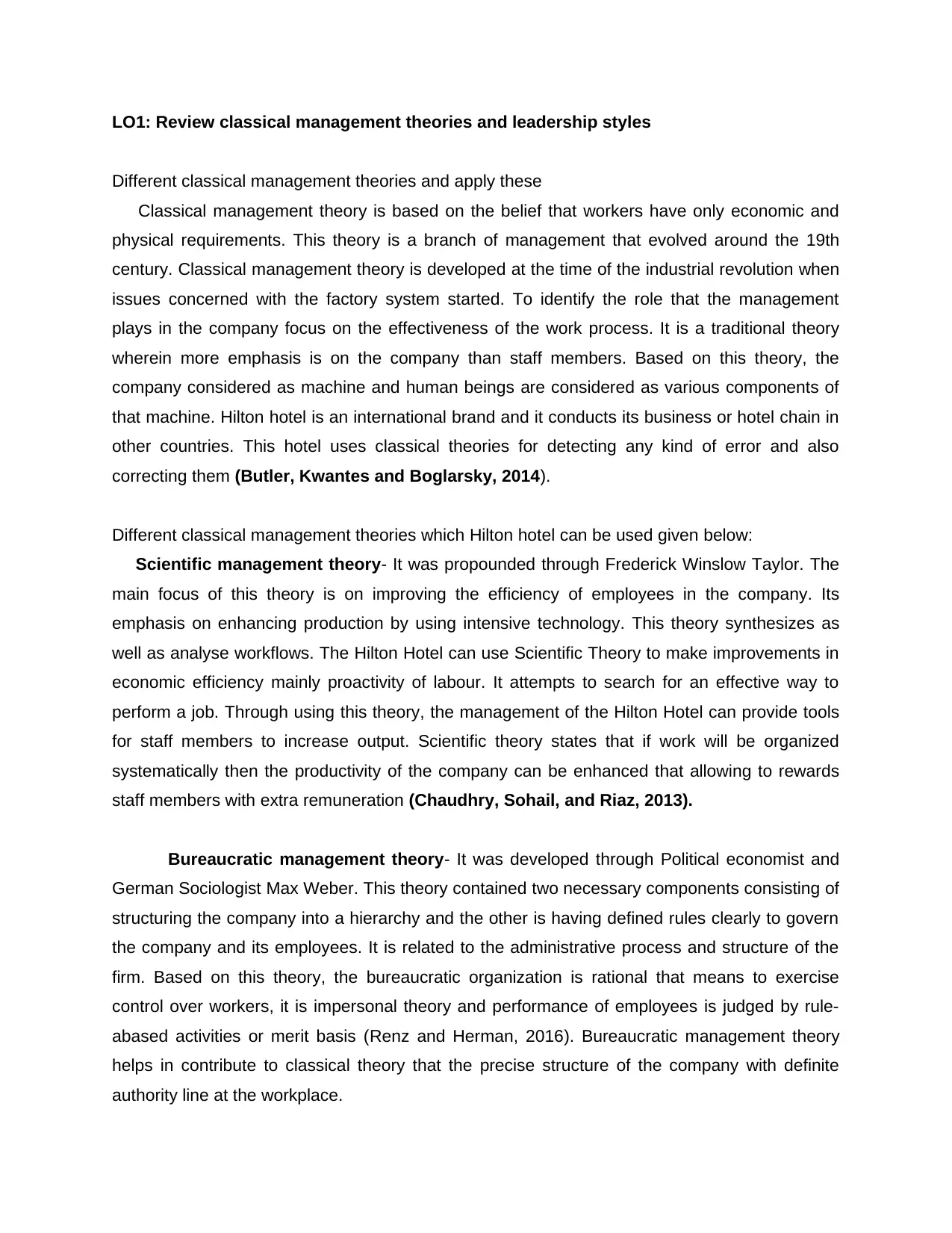
LO1: Review classical management theories and leadership styles
Different classical management theories and apply these
Classical management theory is based on the belief that workers have only economic and
physical requirements. This theory is a branch of management that evolved around the 19th
century. Classical management theory is developed at the time of the industrial revolution when
issues concerned with the factory system started. To identify the role that the management
plays in the company focus on the effectiveness of the work process. It is a traditional theory
wherein more emphasis is on the company than staff members. Based on this theory, the
company considered as machine and human beings are considered as various components of
that machine. Hilton hotel is an international brand and it conducts its business or hotel chain in
other countries. This hotel uses classical theories for detecting any kind of error and also
correcting them (Butler, Kwantes and Boglarsky, 2014).
Different classical management theories which Hilton hotel can be used given below:
Scientific management theory- It was propounded through Frederick Winslow Taylor. The
main focus of this theory is on improving the efficiency of employees in the company. Its
emphasis on enhancing production by using intensive technology. This theory synthesizes as
well as analyse workflows. The Hilton Hotel can use Scientific Theory to make improvements in
economic efficiency mainly proactivity of labour. It attempts to search for an effective way to
perform a job. Through using this theory, the management of the Hilton Hotel can provide tools
for staff members to increase output. Scientific theory states that if work will be organized
systematically then the productivity of the company can be enhanced that allowing to rewards
staff members with extra remuneration (Chaudhry, Sohail, and Riaz, 2013).
Bureaucratic management theory- It was developed through Political economist and
German Sociologist Max Weber. This theory contained two necessary components consisting of
structuring the company into a hierarchy and the other is having defined rules clearly to govern
the company and its employees. It is related to the administrative process and structure of the
firm. Based on this theory, the bureaucratic organization is rational that means to exercise
control over workers, it is impersonal theory and performance of employees is judged by rule-
abased activities or merit basis (Renz and Herman, 2016). Bureaucratic management theory
helps in contribute to classical theory that the precise structure of the company with definite
authority line at the workplace.
Different classical management theories and apply these
Classical management theory is based on the belief that workers have only economic and
physical requirements. This theory is a branch of management that evolved around the 19th
century. Classical management theory is developed at the time of the industrial revolution when
issues concerned with the factory system started. To identify the role that the management
plays in the company focus on the effectiveness of the work process. It is a traditional theory
wherein more emphasis is on the company than staff members. Based on this theory, the
company considered as machine and human beings are considered as various components of
that machine. Hilton hotel is an international brand and it conducts its business or hotel chain in
other countries. This hotel uses classical theories for detecting any kind of error and also
correcting them (Butler, Kwantes and Boglarsky, 2014).
Different classical management theories which Hilton hotel can be used given below:
Scientific management theory- It was propounded through Frederick Winslow Taylor. The
main focus of this theory is on improving the efficiency of employees in the company. Its
emphasis on enhancing production by using intensive technology. This theory synthesizes as
well as analyse workflows. The Hilton Hotel can use Scientific Theory to make improvements in
economic efficiency mainly proactivity of labour. It attempts to search for an effective way to
perform a job. Through using this theory, the management of the Hilton Hotel can provide tools
for staff members to increase output. Scientific theory states that if work will be organized
systematically then the productivity of the company can be enhanced that allowing to rewards
staff members with extra remuneration (Chaudhry, Sohail, and Riaz, 2013).
Bureaucratic management theory- It was developed through Political economist and
German Sociologist Max Weber. This theory contained two necessary components consisting of
structuring the company into a hierarchy and the other is having defined rules clearly to govern
the company and its employees. It is related to the administrative process and structure of the
firm. Based on this theory, the bureaucratic organization is rational that means to exercise
control over workers, it is impersonal theory and performance of employees is judged by rule-
abased activities or merit basis (Renz and Herman, 2016). Bureaucratic management theory
helps in contribute to classical theory that the precise structure of the company with definite
authority line at the workplace.
Paraphrase This Document
Need a fresh take? Get an instant paraphrase of this document with our AI Paraphraser
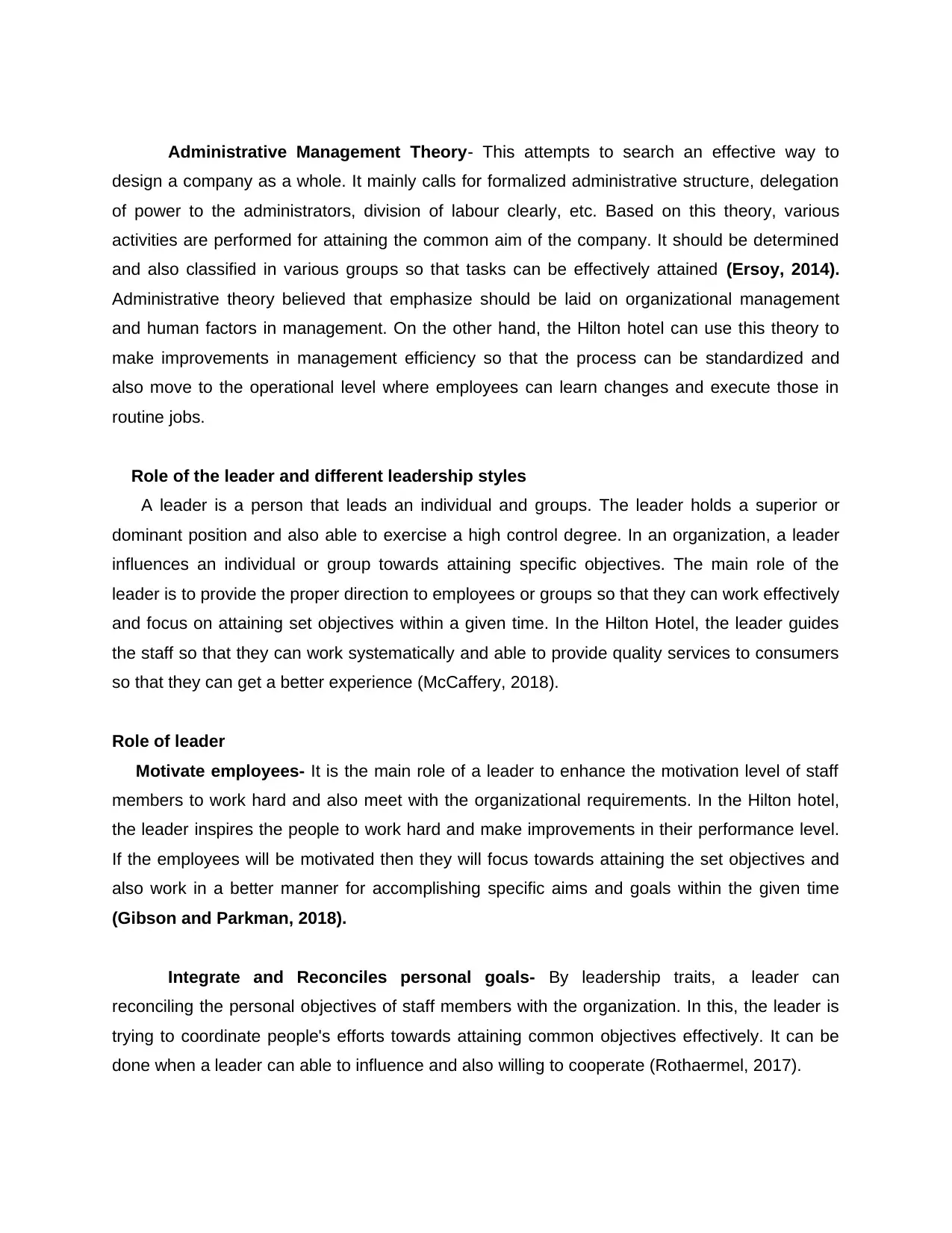
Administrative Management Theory- This attempts to search an effective way to
design a company as a whole. It mainly calls for formalized administrative structure, delegation
of power to the administrators, division of labour clearly, etc. Based on this theory, various
activities are performed for attaining the common aim of the company. It should be determined
and also classified in various groups so that tasks can be effectively attained (Ersoy, 2014).
Administrative theory believed that emphasize should be laid on organizational management
and human factors in management. On the other hand, the Hilton hotel can use this theory to
make improvements in management efficiency so that the process can be standardized and
also move to the operational level where employees can learn changes and execute those in
routine jobs.
Role of the leader and different leadership styles
A leader is a person that leads an individual and groups. The leader holds a superior or
dominant position and also able to exercise a high control degree. In an organization, a leader
influences an individual or group towards attaining specific objectives. The main role of the
leader is to provide the proper direction to employees or groups so that they can work effectively
and focus on attaining set objectives within a given time. In the Hilton Hotel, the leader guides
the staff so that they can work systematically and able to provide quality services to consumers
so that they can get a better experience (McCaffery, 2018).
Role of leader
Motivate employees- It is the main role of a leader to enhance the motivation level of staff
members to work hard and also meet with the organizational requirements. In the Hilton hotel,
the leader inspires the people to work hard and make improvements in their performance level.
If the employees will be motivated then they will focus towards attaining the set objectives and
also work in a better manner for accomplishing specific aims and goals within the given time
(Gibson and Parkman, 2018).
Integrate and Reconciles personal goals- By leadership traits, a leader can
reconciling the personal objectives of staff members with the organization. In this, the leader is
trying to coordinate people's efforts towards attaining common objectives effectively. It can be
done when a leader can able to influence and also willing to cooperate (Rothaermel, 2017).
design a company as a whole. It mainly calls for formalized administrative structure, delegation
of power to the administrators, division of labour clearly, etc. Based on this theory, various
activities are performed for attaining the common aim of the company. It should be determined
and also classified in various groups so that tasks can be effectively attained (Ersoy, 2014).
Administrative theory believed that emphasize should be laid on organizational management
and human factors in management. On the other hand, the Hilton hotel can use this theory to
make improvements in management efficiency so that the process can be standardized and
also move to the operational level where employees can learn changes and execute those in
routine jobs.
Role of the leader and different leadership styles
A leader is a person that leads an individual and groups. The leader holds a superior or
dominant position and also able to exercise a high control degree. In an organization, a leader
influences an individual or group towards attaining specific objectives. The main role of the
leader is to provide the proper direction to employees or groups so that they can work effectively
and focus on attaining set objectives within a given time. In the Hilton Hotel, the leader guides
the staff so that they can work systematically and able to provide quality services to consumers
so that they can get a better experience (McCaffery, 2018).
Role of leader
Motivate employees- It is the main role of a leader to enhance the motivation level of staff
members to work hard and also meet with the organizational requirements. In the Hilton hotel,
the leader inspires the people to work hard and make improvements in their performance level.
If the employees will be motivated then they will focus towards attaining the set objectives and
also work in a better manner for accomplishing specific aims and goals within the given time
(Gibson and Parkman, 2018).
Integrate and Reconciles personal goals- By leadership traits, a leader can
reconciling the personal objectives of staff members with the organization. In this, the leader is
trying to coordinate people's efforts towards attaining common objectives effectively. It can be
done when a leader can able to influence and also willing to cooperate (Rothaermel, 2017).
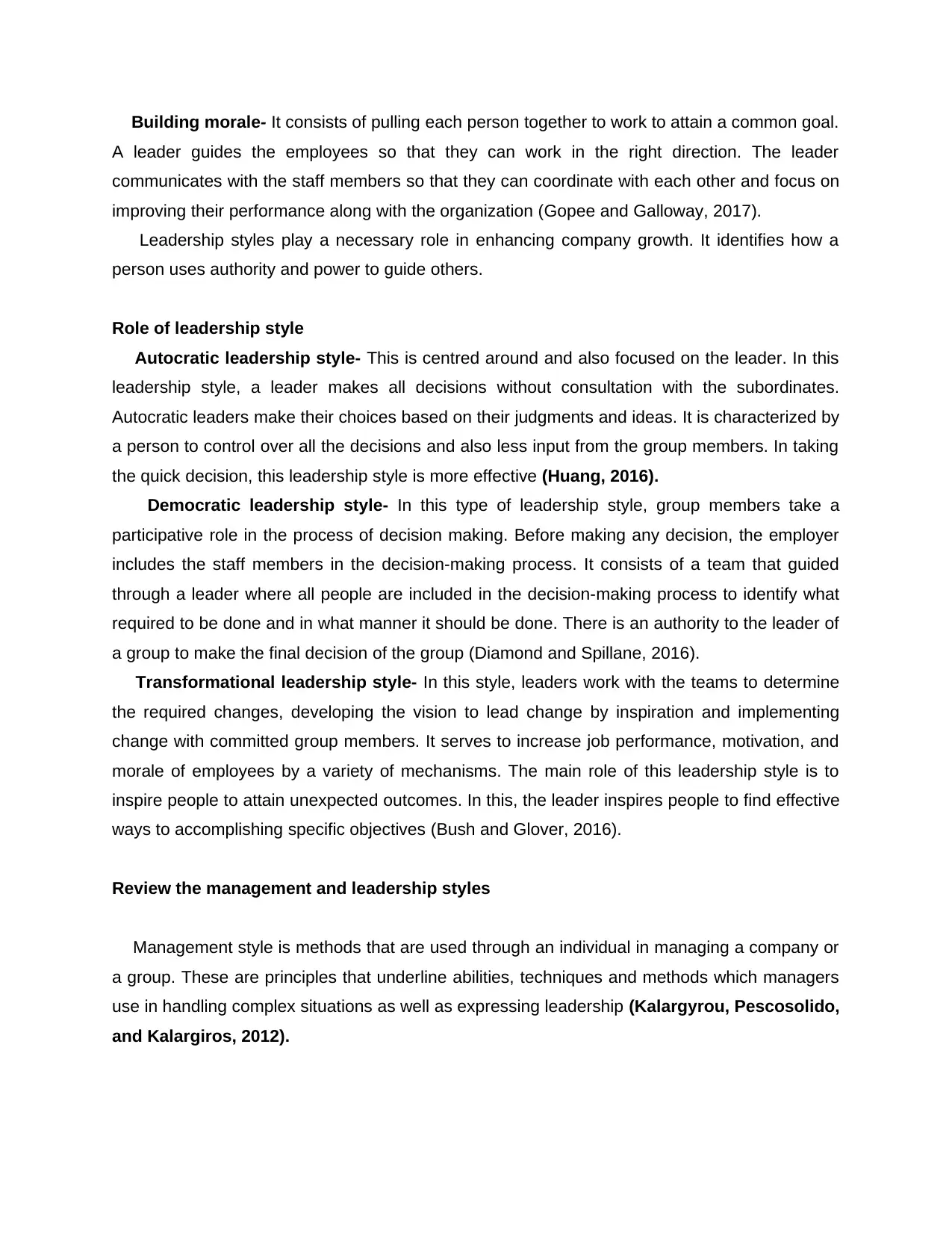
Building morale- It consists of pulling each person together to work to attain a common goal.
A leader guides the employees so that they can work in the right direction. The leader
communicates with the staff members so that they can coordinate with each other and focus on
improving their performance along with the organization (Gopee and Galloway, 2017).
Leadership styles play a necessary role in enhancing company growth. It identifies how a
person uses authority and power to guide others.
Role of leadership style
Autocratic leadership style- This is centred around and also focused on the leader. In this
leadership style, a leader makes all decisions without consultation with the subordinates.
Autocratic leaders make their choices based on their judgments and ideas. It is characterized by
a person to control over all the decisions and also less input from the group members. In taking
the quick decision, this leadership style is more effective (Huang, 2016).
Democratic leadership style- In this type of leadership style, group members take a
participative role in the process of decision making. Before making any decision, the employer
includes the staff members in the decision-making process. It consists of a team that guided
through a leader where all people are included in the decision-making process to identify what
required to be done and in what manner it should be done. There is an authority to the leader of
a group to make the final decision of the group (Diamond and Spillane, 2016).
Transformational leadership style- In this style, leaders work with the teams to determine
the required changes, developing the vision to lead change by inspiration and implementing
change with committed group members. It serves to increase job performance, motivation, and
morale of employees by a variety of mechanisms. The main role of this leadership style is to
inspire people to attain unexpected outcomes. In this, the leader inspires people to find effective
ways to accomplishing specific objectives (Bush and Glover, 2016).
Review the management and leadership styles
Management style is methods that are used through an individual in managing a company or
a group. These are principles that underline abilities, techniques and methods which managers
use in handling complex situations as well as expressing leadership (Kalargyrou, Pescosolido,
and Kalargiros, 2012).
A leader guides the employees so that they can work in the right direction. The leader
communicates with the staff members so that they can coordinate with each other and focus on
improving their performance along with the organization (Gopee and Galloway, 2017).
Leadership styles play a necessary role in enhancing company growth. It identifies how a
person uses authority and power to guide others.
Role of leadership style
Autocratic leadership style- This is centred around and also focused on the leader. In this
leadership style, a leader makes all decisions without consultation with the subordinates.
Autocratic leaders make their choices based on their judgments and ideas. It is characterized by
a person to control over all the decisions and also less input from the group members. In taking
the quick decision, this leadership style is more effective (Huang, 2016).
Democratic leadership style- In this type of leadership style, group members take a
participative role in the process of decision making. Before making any decision, the employer
includes the staff members in the decision-making process. It consists of a team that guided
through a leader where all people are included in the decision-making process to identify what
required to be done and in what manner it should be done. There is an authority to the leader of
a group to make the final decision of the group (Diamond and Spillane, 2016).
Transformational leadership style- In this style, leaders work with the teams to determine
the required changes, developing the vision to lead change by inspiration and implementing
change with committed group members. It serves to increase job performance, motivation, and
morale of employees by a variety of mechanisms. The main role of this leadership style is to
inspire people to attain unexpected outcomes. In this, the leader inspires people to find effective
ways to accomplishing specific objectives (Bush and Glover, 2016).
Review the management and leadership styles
Management style is methods that are used through an individual in managing a company or
a group. These are principles that underline abilities, techniques and methods which managers
use in handling complex situations as well as expressing leadership (Kalargyrou, Pescosolido,
and Kalargiros, 2012).
⊘ This is a preview!⊘
Do you want full access?
Subscribe today to unlock all pages.

Trusted by 1+ million students worldwide
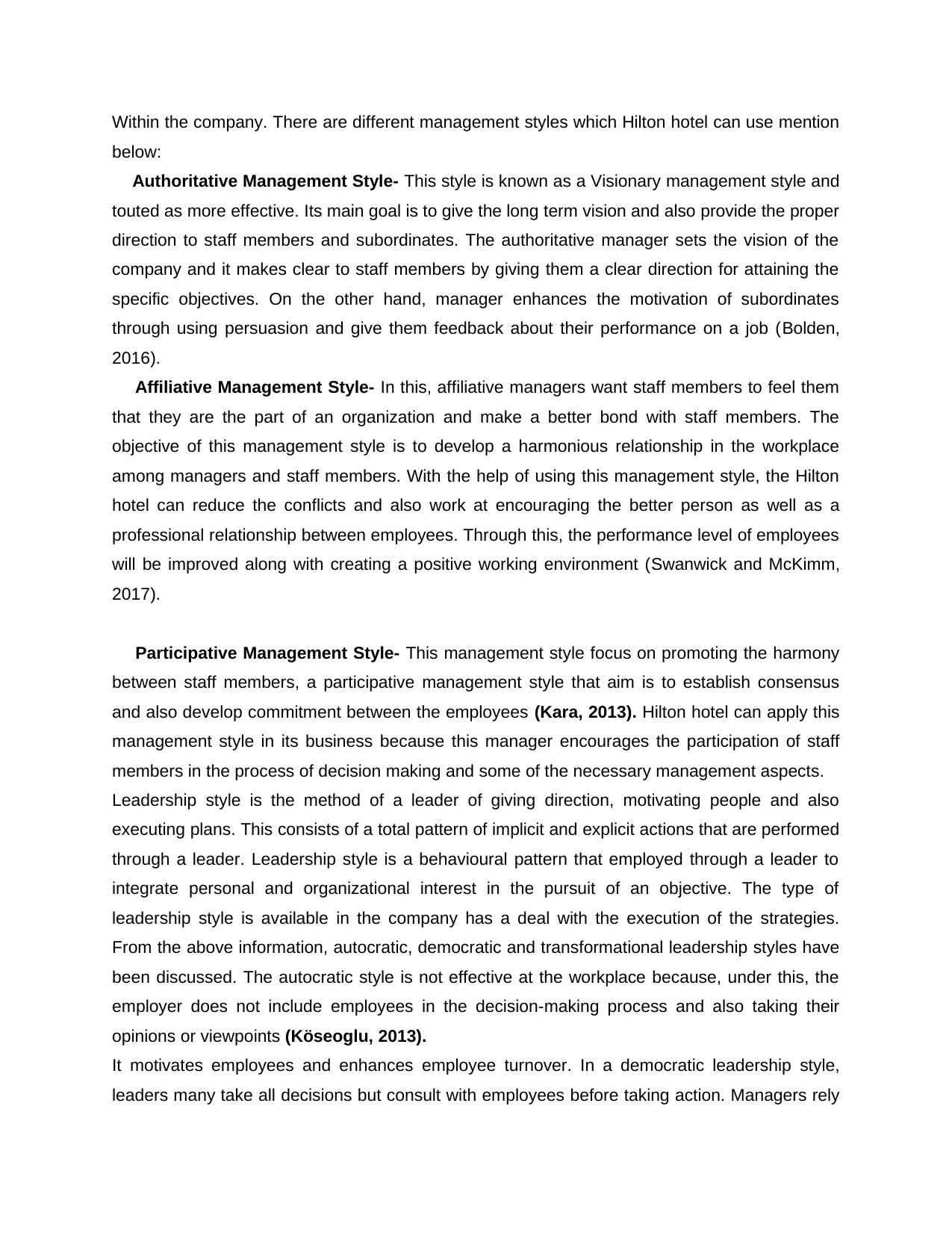
Within the company. There are different management styles which Hilton hotel can use mention
below:
Authoritative Management Style- This style is known as a Visionary management style and
touted as more effective. Its main goal is to give the long term vision and also provide the proper
direction to staff members and subordinates. The authoritative manager sets the vision of the
company and it makes clear to staff members by giving them a clear direction for attaining the
specific objectives. On the other hand, manager enhances the motivation of subordinates
through using persuasion and give them feedback about their performance on a job (Bolden,
2016).
Affiliative Management Style- In this, affiliative managers want staff members to feel them
that they are the part of an organization and make a better bond with staff members. The
objective of this management style is to develop a harmonious relationship in the workplace
among managers and staff members. With the help of using this management style, the Hilton
hotel can reduce the conflicts and also work at encouraging the better person as well as a
professional relationship between employees. Through this, the performance level of employees
will be improved along with creating a positive working environment (Swanwick and McKimm,
2017).
Participative Management Style- This management style focus on promoting the harmony
between staff members, a participative management style that aim is to establish consensus
and also develop commitment between the employees (Kara, 2013). Hilton hotel can apply this
management style in its business because this manager encourages the participation of staff
members in the process of decision making and some of the necessary management aspects.
Leadership style is the method of a leader of giving direction, motivating people and also
executing plans. This consists of a total pattern of implicit and explicit actions that are performed
through a leader. Leadership style is a behavioural pattern that employed through a leader to
integrate personal and organizational interest in the pursuit of an objective. The type of
leadership style is available in the company has a deal with the execution of the strategies.
From the above information, autocratic, democratic and transformational leadership styles have
been discussed. The autocratic style is not effective at the workplace because, under this, the
employer does not include employees in the decision-making process and also taking their
opinions or viewpoints (Köseoglu, 2013).
It motivates employees and enhances employee turnover. In a democratic leadership style,
leaders many take all decisions but consult with employees before taking action. Managers rely
below:
Authoritative Management Style- This style is known as a Visionary management style and
touted as more effective. Its main goal is to give the long term vision and also provide the proper
direction to staff members and subordinates. The authoritative manager sets the vision of the
company and it makes clear to staff members by giving them a clear direction for attaining the
specific objectives. On the other hand, manager enhances the motivation of subordinates
through using persuasion and give them feedback about their performance on a job (Bolden,
2016).
Affiliative Management Style- In this, affiliative managers want staff members to feel them
that they are the part of an organization and make a better bond with staff members. The
objective of this management style is to develop a harmonious relationship in the workplace
among managers and staff members. With the help of using this management style, the Hilton
hotel can reduce the conflicts and also work at encouraging the better person as well as a
professional relationship between employees. Through this, the performance level of employees
will be improved along with creating a positive working environment (Swanwick and McKimm,
2017).
Participative Management Style- This management style focus on promoting the harmony
between staff members, a participative management style that aim is to establish consensus
and also develop commitment between the employees (Kara, 2013). Hilton hotel can apply this
management style in its business because this manager encourages the participation of staff
members in the process of decision making and some of the necessary management aspects.
Leadership style is the method of a leader of giving direction, motivating people and also
executing plans. This consists of a total pattern of implicit and explicit actions that are performed
through a leader. Leadership style is a behavioural pattern that employed through a leader to
integrate personal and organizational interest in the pursuit of an objective. The type of
leadership style is available in the company has a deal with the execution of the strategies.
From the above information, autocratic, democratic and transformational leadership styles have
been discussed. The autocratic style is not effective at the workplace because, under this, the
employer does not include employees in the decision-making process and also taking their
opinions or viewpoints (Köseoglu, 2013).
It motivates employees and enhances employee turnover. In a democratic leadership style,
leaders many take all decisions but consult with employees before taking action. Managers rely
Paraphrase This Document
Need a fresh take? Get an instant paraphrase of this document with our AI Paraphraser
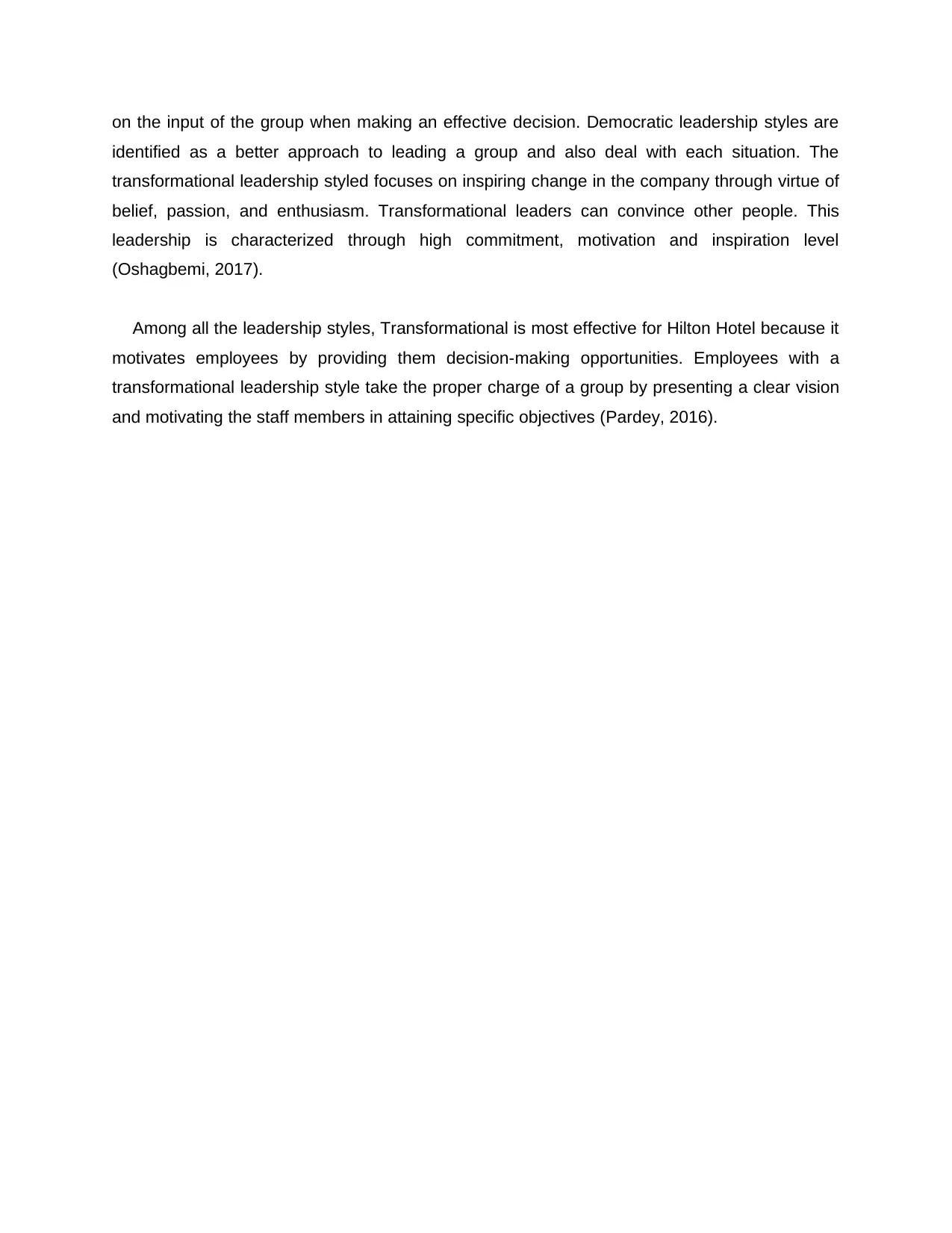
on the input of the group when making an effective decision. Democratic leadership styles are
identified as a better approach to leading a group and also deal with each situation. The
transformational leadership styled focuses on inspiring change in the company through virtue of
belief, passion, and enthusiasm. Transformational leaders can convince other people. This
leadership is characterized through high commitment, motivation and inspiration level
(Oshagbemi, 2017).
Among all the leadership styles, Transformational is most effective for Hilton Hotel because it
motivates employees by providing them decision-making opportunities. Employees with a
transformational leadership style take the proper charge of a group by presenting a clear vision
and motivating the staff members in attaining specific objectives (Pardey, 2016).
identified as a better approach to leading a group and also deal with each situation. The
transformational leadership styled focuses on inspiring change in the company through virtue of
belief, passion, and enthusiasm. Transformational leaders can convince other people. This
leadership is characterized through high commitment, motivation and inspiration level
(Oshagbemi, 2017).
Among all the leadership styles, Transformational is most effective for Hilton Hotel because it
motivates employees by providing them decision-making opportunities. Employees with a
transformational leadership style take the proper charge of a group by presenting a clear vision
and motivating the staff members in attaining specific objectives (Pardey, 2016).
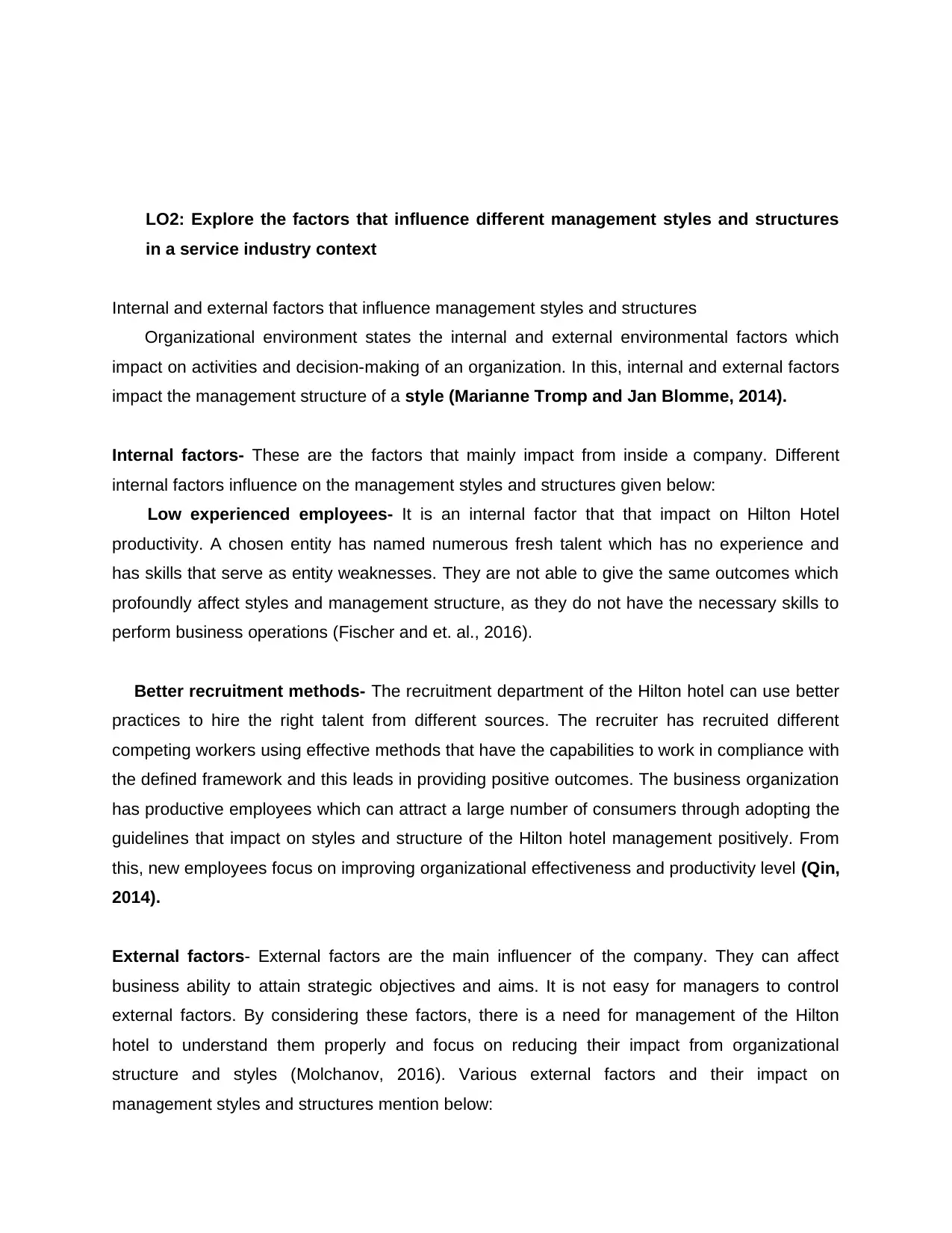
LO2: Explore the factors that influence different management styles and structures
in a service industry context
Internal and external factors that influence management styles and structures
Organizational environment states the internal and external environmental factors which
impact on activities and decision-making of an organization. In this, internal and external factors
impact the management structure of a style (Marianne Tromp and Jan Blomme, 2014).
Internal factors- These are the factors that mainly impact from inside a company. Different
internal factors influence on the management styles and structures given below:
Low experienced employees- It is an internal factor that that impact on Hilton Hotel
productivity. A chosen entity has named numerous fresh talent which has no experience and
has skills that serve as entity weaknesses. They are not able to give the same outcomes which
profoundly affect styles and management structure, as they do not have the necessary skills to
perform business operations (Fischer and et. al., 2016).
Better recruitment methods- The recruitment department of the Hilton hotel can use better
practices to hire the right talent from different sources. The recruiter has recruited different
competing workers using effective methods that have the capabilities to work in compliance with
the defined framework and this leads in providing positive outcomes. The business organization
has productive employees which can attract a large number of consumers through adopting the
guidelines that impact on styles and structure of the Hilton hotel management positively. From
this, new employees focus on improving organizational effectiveness and productivity level (Qin,
2014).
External factors- External factors are the main influencer of the company. They can affect
business ability to attain strategic objectives and aims. It is not easy for managers to control
external factors. By considering these factors, there is a need for management of the Hilton
hotel to understand them properly and focus on reducing their impact from organizational
structure and styles (Molchanov, 2016). Various external factors and their impact on
management styles and structures mention below:
in a service industry context
Internal and external factors that influence management styles and structures
Organizational environment states the internal and external environmental factors which
impact on activities and decision-making of an organization. In this, internal and external factors
impact the management structure of a style (Marianne Tromp and Jan Blomme, 2014).
Internal factors- These are the factors that mainly impact from inside a company. Different
internal factors influence on the management styles and structures given below:
Low experienced employees- It is an internal factor that that impact on Hilton Hotel
productivity. A chosen entity has named numerous fresh talent which has no experience and
has skills that serve as entity weaknesses. They are not able to give the same outcomes which
profoundly affect styles and management structure, as they do not have the necessary skills to
perform business operations (Fischer and et. al., 2016).
Better recruitment methods- The recruitment department of the Hilton hotel can use better
practices to hire the right talent from different sources. The recruiter has recruited different
competing workers using effective methods that have the capabilities to work in compliance with
the defined framework and this leads in providing positive outcomes. The business organization
has productive employees which can attract a large number of consumers through adopting the
guidelines that impact on styles and structure of the Hilton hotel management positively. From
this, new employees focus on improving organizational effectiveness and productivity level (Qin,
2014).
External factors- External factors are the main influencer of the company. They can affect
business ability to attain strategic objectives and aims. It is not easy for managers to control
external factors. By considering these factors, there is a need for management of the Hilton
hotel to understand them properly and focus on reducing their impact from organizational
structure and styles (Molchanov, 2016). Various external factors and their impact on
management styles and structures mention below:
⊘ This is a preview!⊘
Do you want full access?
Subscribe today to unlock all pages.

Trusted by 1+ million students worldwide
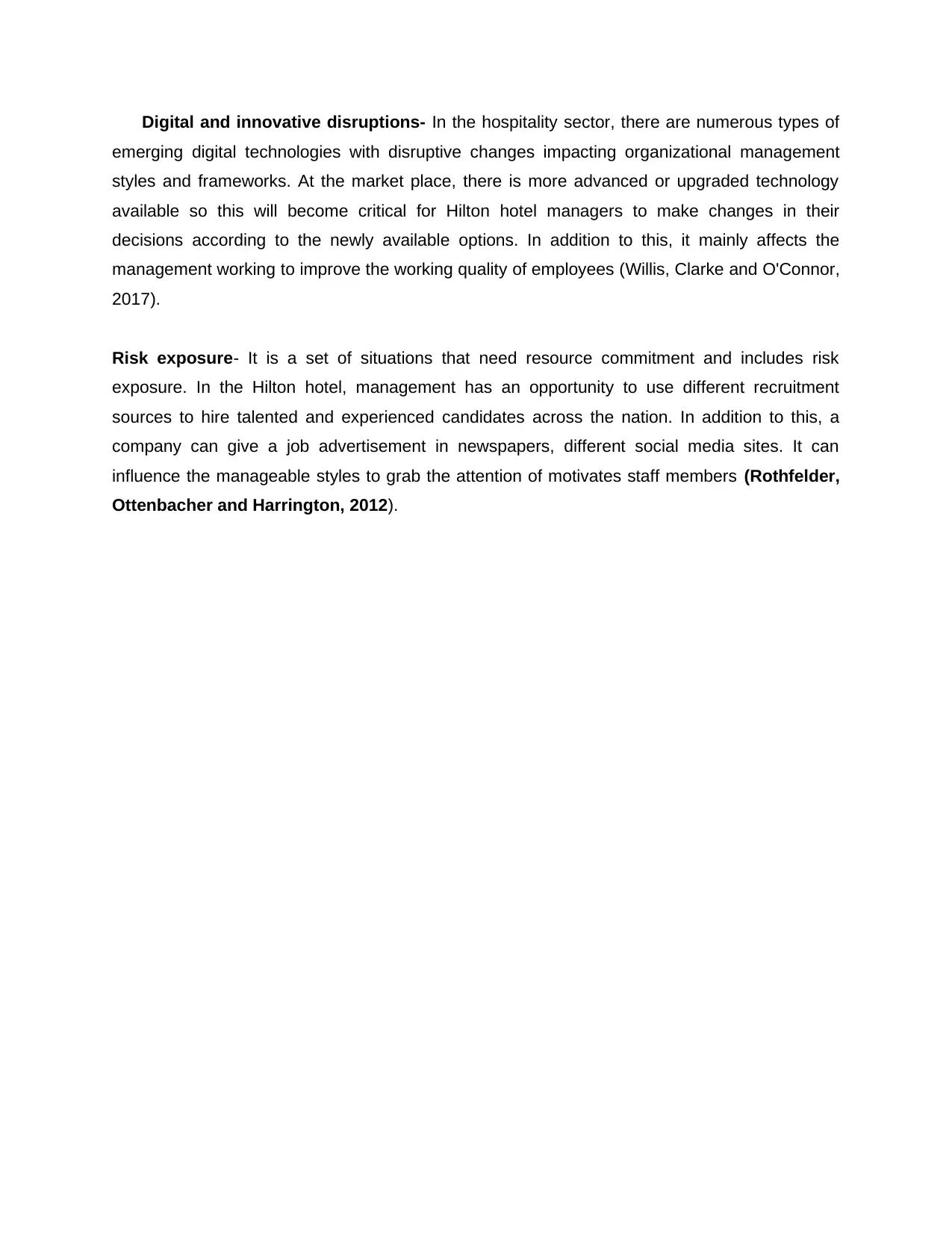
Digital and innovative disruptions- In the hospitality sector, there are numerous types of
emerging digital technologies with disruptive changes impacting organizational management
styles and frameworks. At the market place, there is more advanced or upgraded technology
available so this will become critical for Hilton hotel managers to make changes in their
decisions according to the newly available options. In addition to this, it mainly affects the
management working to improve the working quality of employees (Willis, Clarke and O'Connor,
2017).
Risk exposure- It is a set of situations that need resource commitment and includes risk
exposure. In the Hilton hotel, management has an opportunity to use different recruitment
sources to hire talented and experienced candidates across the nation. In addition to this, a
company can give a job advertisement in newspapers, different social media sites. It can
influence the manageable styles to grab the attention of motivates staff members (Rothfelder,
Ottenbacher and Harrington, 2012).
emerging digital technologies with disruptive changes impacting organizational management
styles and frameworks. At the market place, there is more advanced or upgraded technology
available so this will become critical for Hilton hotel managers to make changes in their
decisions according to the newly available options. In addition to this, it mainly affects the
management working to improve the working quality of employees (Willis, Clarke and O'Connor,
2017).
Risk exposure- It is a set of situations that need resource commitment and includes risk
exposure. In the Hilton hotel, management has an opportunity to use different recruitment
sources to hire talented and experienced candidates across the nation. In addition to this, a
company can give a job advertisement in newspapers, different social media sites. It can
influence the manageable styles to grab the attention of motivates staff members (Rothfelder,
Ottenbacher and Harrington, 2012).
Paraphrase This Document
Need a fresh take? Get an instant paraphrase of this document with our AI Paraphraser
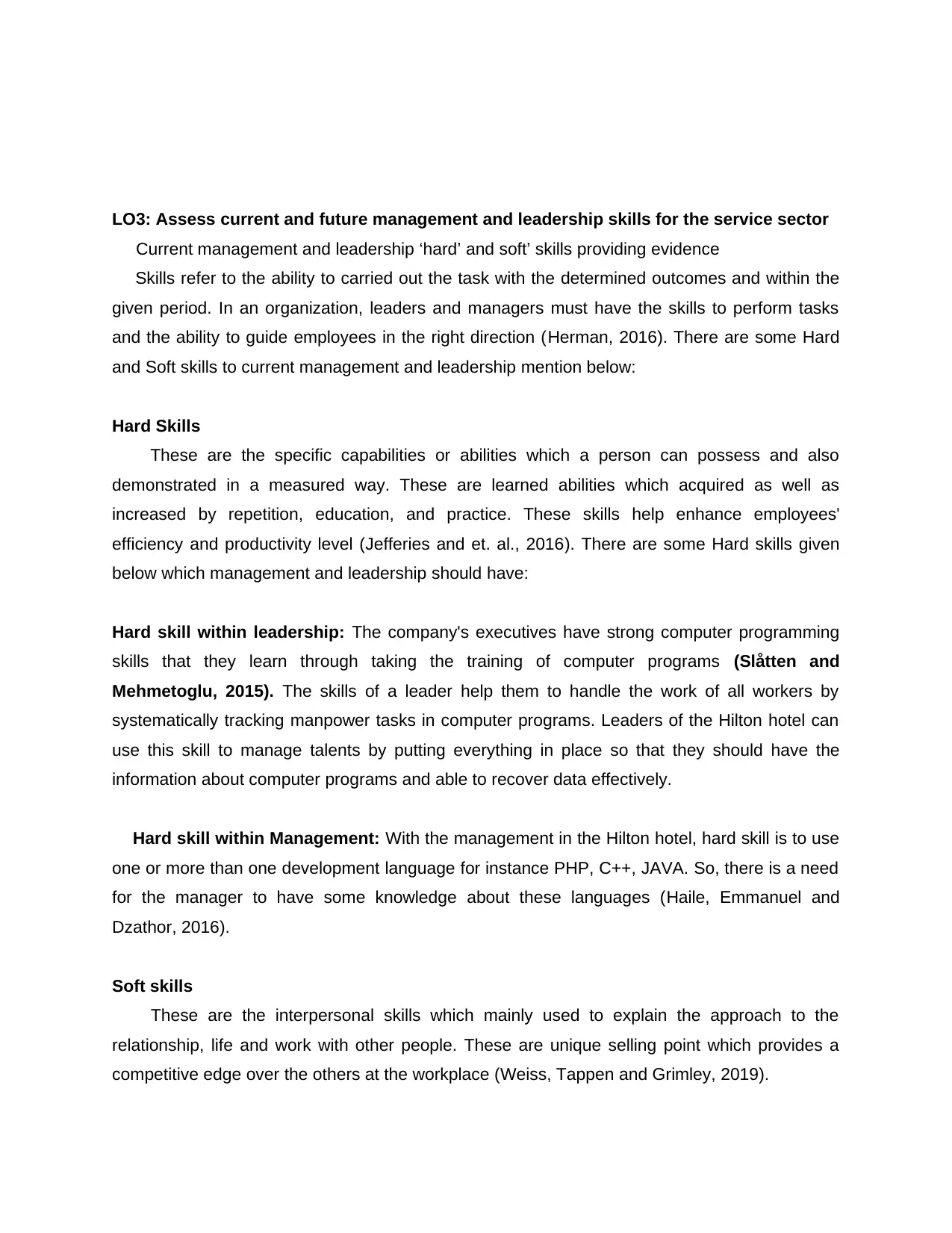
LO3: Assess current and future management and leadership skills for the service sector
Current management and leadership ‘hard’ and soft’ skills providing evidence
Skills refer to the ability to carried out the task with the determined outcomes and within the
given period. In an organization, leaders and managers must have the skills to perform tasks
and the ability to guide employees in the right direction (Herman, 2016). There are some Hard
and Soft skills to current management and leadership mention below:
Hard Skills
These are the specific capabilities or abilities which a person can possess and also
demonstrated in a measured way. These are learned abilities which acquired as well as
increased by repetition, education, and practice. These skills help enhance employees'
efficiency and productivity level (Jefferies and et. al., 2016). There are some Hard skills given
below which management and leadership should have:
Hard skill within leadership: The company's executives have strong computer programming
skills that they learn through taking the training of computer programs (Slåtten and
Mehmetoglu, 2015). The skills of a leader help them to handle the work of all workers by
systematically tracking manpower tasks in computer programs. Leaders of the Hilton hotel can
use this skill to manage talents by putting everything in place so that they should have the
information about computer programs and able to recover data effectively.
Hard skill within Management: With the management in the Hilton hotel, hard skill is to use
one or more than one development language for instance PHP, C++, JAVA. So, there is a need
for the manager to have some knowledge about these languages (Haile, Emmanuel and
Dzathor, 2016).
Soft skills
These are the interpersonal skills which mainly used to explain the approach to the
relationship, life and work with other people. These are unique selling point which provides a
competitive edge over the others at the workplace (Weiss, Tappen and Grimley, 2019).
Current management and leadership ‘hard’ and soft’ skills providing evidence
Skills refer to the ability to carried out the task with the determined outcomes and within the
given period. In an organization, leaders and managers must have the skills to perform tasks
and the ability to guide employees in the right direction (Herman, 2016). There are some Hard
and Soft skills to current management and leadership mention below:
Hard Skills
These are the specific capabilities or abilities which a person can possess and also
demonstrated in a measured way. These are learned abilities which acquired as well as
increased by repetition, education, and practice. These skills help enhance employees'
efficiency and productivity level (Jefferies and et. al., 2016). There are some Hard skills given
below which management and leadership should have:
Hard skill within leadership: The company's executives have strong computer programming
skills that they learn through taking the training of computer programs (Slåtten and
Mehmetoglu, 2015). The skills of a leader help them to handle the work of all workers by
systematically tracking manpower tasks in computer programs. Leaders of the Hilton hotel can
use this skill to manage talents by putting everything in place so that they should have the
information about computer programs and able to recover data effectively.
Hard skill within Management: With the management in the Hilton hotel, hard skill is to use
one or more than one development language for instance PHP, C++, JAVA. So, there is a need
for the manager to have some knowledge about these languages (Haile, Emmanuel and
Dzathor, 2016).
Soft skills
These are the interpersonal skills which mainly used to explain the approach to the
relationship, life and work with other people. These are unique selling point which provides a
competitive edge over the others at the workplace (Weiss, Tappen and Grimley, 2019).
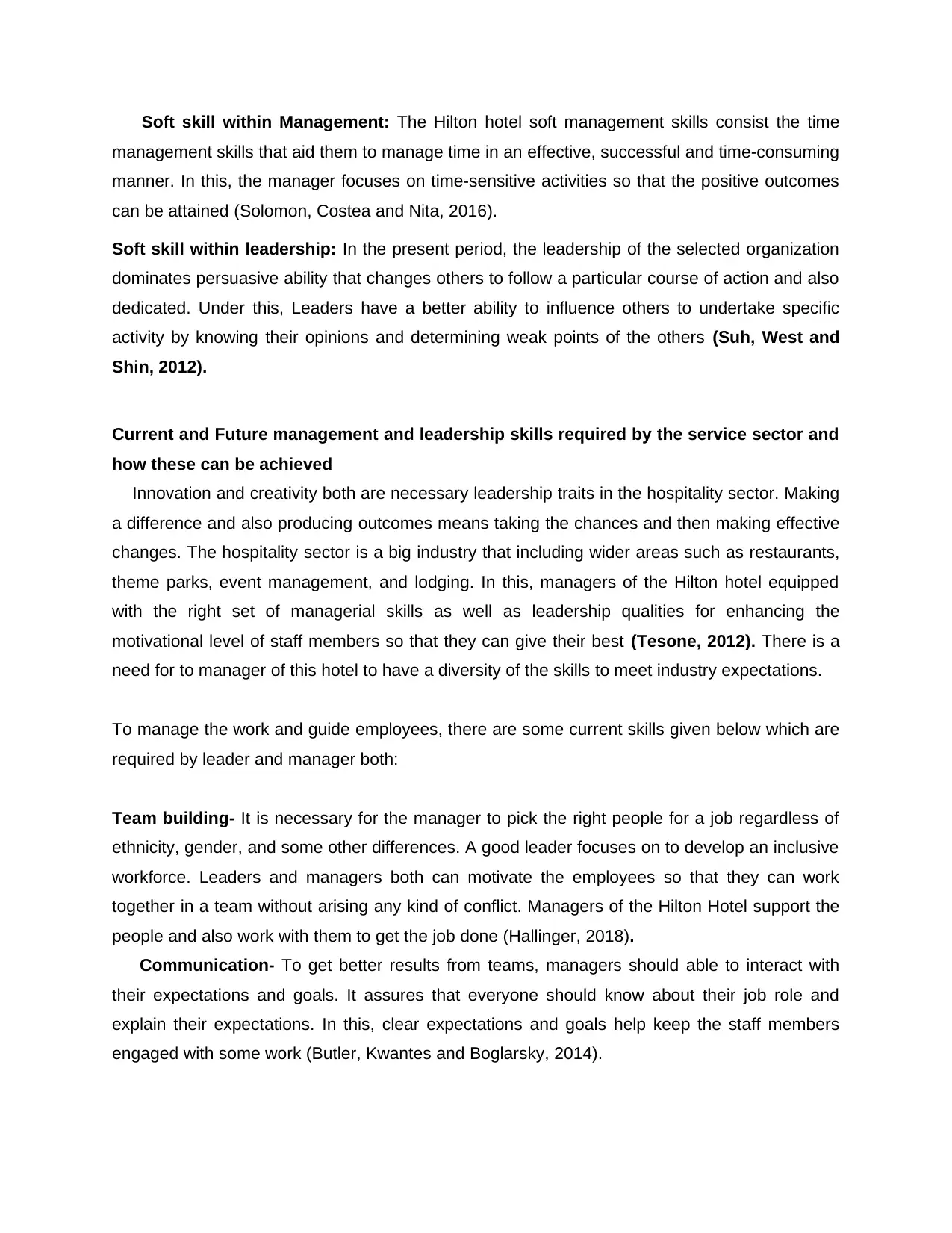
Soft skill within Management: The Hilton hotel soft management skills consist the time
management skills that aid them to manage time in an effective, successful and time-consuming
manner. In this, the manager focuses on time-sensitive activities so that the positive outcomes
can be attained (Solomon, Costea and Nita, 2016).
Soft skill within leadership: In the present period, the leadership of the selected organization
dominates persuasive ability that changes others to follow a particular course of action and also
dedicated. Under this, Leaders have a better ability to influence others to undertake specific
activity by knowing their opinions and determining weak points of the others (Suh, West and
Shin, 2012).
Current and Future management and leadership skills required by the service sector and
how these can be achieved
Innovation and creativity both are necessary leadership traits in the hospitality sector. Making
a difference and also producing outcomes means taking the chances and then making effective
changes. The hospitality sector is a big industry that including wider areas such as restaurants,
theme parks, event management, and lodging. In this, managers of the Hilton hotel equipped
with the right set of managerial skills as well as leadership qualities for enhancing the
motivational level of staff members so that they can give their best (Tesone, 2012). There is a
need for to manager of this hotel to have a diversity of the skills to meet industry expectations.
To manage the work and guide employees, there are some current skills given below which are
required by leader and manager both:
Team building- It is necessary for the manager to pick the right people for a job regardless of
ethnicity, gender, and some other differences. A good leader focuses on to develop an inclusive
workforce. Leaders and managers both can motivate the employees so that they can work
together in a team without arising any kind of conflict. Managers of the Hilton Hotel support the
people and also work with them to get the job done (Hallinger, 2018).
Communication- To get better results from teams, managers should able to interact with
their expectations and goals. It assures that everyone should know about their job role and
explain their expectations. In this, clear expectations and goals help keep the staff members
engaged with some work (Butler, Kwantes and Boglarsky, 2014).
management skills that aid them to manage time in an effective, successful and time-consuming
manner. In this, the manager focuses on time-sensitive activities so that the positive outcomes
can be attained (Solomon, Costea and Nita, 2016).
Soft skill within leadership: In the present period, the leadership of the selected organization
dominates persuasive ability that changes others to follow a particular course of action and also
dedicated. Under this, Leaders have a better ability to influence others to undertake specific
activity by knowing their opinions and determining weak points of the others (Suh, West and
Shin, 2012).
Current and Future management and leadership skills required by the service sector and
how these can be achieved
Innovation and creativity both are necessary leadership traits in the hospitality sector. Making
a difference and also producing outcomes means taking the chances and then making effective
changes. The hospitality sector is a big industry that including wider areas such as restaurants,
theme parks, event management, and lodging. In this, managers of the Hilton hotel equipped
with the right set of managerial skills as well as leadership qualities for enhancing the
motivational level of staff members so that they can give their best (Tesone, 2012). There is a
need for to manager of this hotel to have a diversity of the skills to meet industry expectations.
To manage the work and guide employees, there are some current skills given below which are
required by leader and manager both:
Team building- It is necessary for the manager to pick the right people for a job regardless of
ethnicity, gender, and some other differences. A good leader focuses on to develop an inclusive
workforce. Leaders and managers both can motivate the employees so that they can work
together in a team without arising any kind of conflict. Managers of the Hilton Hotel support the
people and also work with them to get the job done (Hallinger, 2018).
Communication- To get better results from teams, managers should able to interact with
their expectations and goals. It assures that everyone should know about their job role and
explain their expectations. In this, clear expectations and goals help keep the staff members
engaged with some work (Butler, Kwantes and Boglarsky, 2014).
⊘ This is a preview!⊘
Do you want full access?
Subscribe today to unlock all pages.

Trusted by 1+ million students worldwide
1 out of 20
Related Documents
Your All-in-One AI-Powered Toolkit for Academic Success.
+13062052269
info@desklib.com
Available 24*7 on WhatsApp / Email
![[object Object]](/_next/static/media/star-bottom.7253800d.svg)
Unlock your academic potential
Copyright © 2020–2026 A2Z Services. All Rights Reserved. Developed and managed by ZUCOL.




